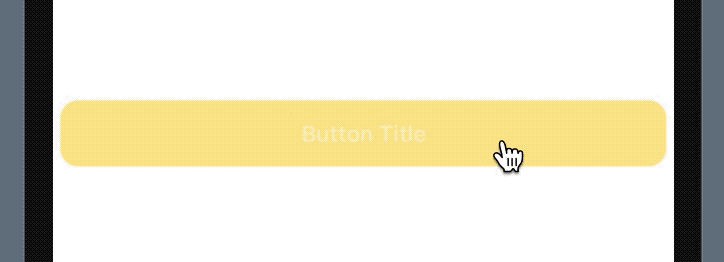SwiftUIжҢүй’®д»…еңЁж–Үжң¬йғЁеҲҶдёҠзӮ№еҮ»
жҲ‘жҢүй’®зҡ„иғҢжҷҜеҢәеҹҹжңӘжЈҖжөӢеҲ°з”ЁжҲ·дәӨдә’гҖӮдёҺиҜҘжҢүй’®дәӨдә’зҡ„е”ҜдёҖж–№жі•жҳҜзӮ№еҮ»жҢүй’®зҡ„вҖңж–Үжң¬/ж ҮзӯҫвҖқеҢәеҹҹгҖӮеҰӮдҪ•дҪҝж•ҙдёӘButtonеҸҜиҪ»ж•Іпјҹ
struct ScheduleEditorButtonSwiftUIView: View {
@Binding var buttonTagForAction : ScheduleButtonType
@Binding var buttonTitle : String
@Binding var buttonBackgroundColor : Color
let buttonCornerRadius = CGFloat(12)
var body: some View {
Button(buttonTitle) {
buttonActionForTag(self.buttonTagForAction)
}.frame(minWidth: (UIScreen.main.bounds.size.width / 2) - 25, maxWidth: .infinity, minHeight: 44)
.buttonStyle(DefaultButtonStyle())
.lineLimit(2)
.multilineTextAlignment(.center)
.font(Font.subheadline.weight(.bold))
.foregroundColor(Color.white)
.border(Color("AppHighlightedColour"), width: 2)
.background(buttonBackgroundColor).opacity(0.8)
.tag(self.buttonTagForAction)
.padding([.leading,.trailing], 5)
.cornerRadius(buttonCornerRadius)
}
}
5 дёӘзӯ”жЎҲ:
зӯ”жЎҲ 0 :(еҫ—еҲҶпјҡ7)
жӮЁеҸҜд»ҘйҖҡиҝҮж·»еҠ дҝ®йҘ°з¬ҰжқҘе®ҡд№үз”ЁдәҺе‘ҪдёӯжөӢиҜ•зҡ„еҶ…е®№еҪўзҠ¶пјҡcontentShape(_:eoFill:)
йҮҚиҰҒзҡ„жҳҜдҪ еҝ…йЎ»еңЁ Button зҡ„еҶ…е®№дёӯеә”з”ЁгҖӮ
True
>>>
еҸҰдёҖдёӘ
Button(action: {}) {
Text("Select file")
.frame(width: 300)
.padding(100.0)
.foregroundColor(Color.black)
.contentShape(Rectangle()) // Add this line
}
.background(Color.green)
.cornerRadius(4)
.buttonStyle(PlainButtonStyle())
зӯ”жЎҲ 1 :(еҫ—еҲҶпјҡ1)
иҝҷеҸҜд»Ҙи§ЈеҶіжҲ‘зҡ„й—®йўҳпјҡ
var body: some View {
GeometryReader { geometry in
Button(action: {
// Action
}) {
Text("Button Title")
.frame(
minWidth: (geometry.size.width / 2) - 25,
maxWidth: .infinity, minHeight: 44
)
.font(Font.subheadline.weight(.bold))
.background(Color.yellow).opacity(0.8)
.foregroundColor(Color.white)
.cornerRadius(12)
}
.lineLimit(2)
.multilineTextAlignment(.center)
.padding([.leading,.trailing], 5)
}
}
жӮЁжҳҜеҗҰжңүзҗҶз”ұдҪҝз”ЁUIScreenиҖҢдёҚжҳҜGeometryReaderпјҹ
зӯ”жЎҲ 2 :(еҫ—еҲҶпјҡ1)
жҲ‘и®ӨдёәиҝҷжҳҜдёҖдёӘжӣҙеҘҪзҡ„и§ЈеҶіж–№жЎҲпјҢе°Ҷ.frameеҖјж·»еҠ еҲ°Text()дёҠпјҢжҢүй’®е°ҶиҰҶзӣ–ж•ҙдёӘеҢәеҹҹ?
Button(action: {
//code
}) {
Text("Click Me")
.frame(minWidth: 100, maxWidth: .infinity, minHeight: 44, maxHeight: 44, alignment: .center)
.foregroundColor(Color.white)
.background(Color.accentColor)
.cornerRadius(7)
}
зӯ”жЎҲ 3 :(еҫ—еҲҶпјҡ1)
зӯ”жЎҲжқҘеҫ—жңүзӮ№жҷҡпјҢдҪҶжҳҜжҲ‘еҸ‘зҺ°дәҶдёӨз§Қж–№жі•еҸҜд»ҘеҒҡеҲ°иҝҷдёҖзӮ№-
йҖүйЎ№1пјҡдҪҝз”ЁеҮ дҪ•иҜ»еҸ–еҷЁ
Button(action: {
}) {
GeometryReader { geometryProxy in
Text("Button Title")
.font(Font.custom("SFProDisplay-Semibold", size: 19))
.foregroundColor(Color.white)
.frame(width: geometryProxy.size.width - 20 * 2) // horizontal margin
.padding([.top, .bottom], 10) // vertical padding
.background(Color.yellow)
.cornerRadius(6)
}
}
йҖүйЎ№2пјҡе°ҶHStackдёҺеһ«зүҮдёҖиө·дҪҝз”Ё
HStack {
Spacer(minLength: 20) // horizontal margin
Button(action: {
}) {
Text("Hello World")
.font(Font.custom("SFProDisplay-Semibold", size: 19))
.frame(maxWidth:.infinity)
.padding([.top, .bottom], 10) // vertical padding
.background(Color.yellow)
.foregroundColor(Color.white)
.cornerRadius(6)
}
Spacer(minLength: 20)
}.frame(maxWidth:.infinity)
жҲ‘еңЁиҝҷйҮҢзҡ„жҖқиҖғиҝҮзЁӢжҳҜпјҢе°Ҫз®ЎйҖүйЎ№1жӣҙз®ҖжҙҒпјҢдҪҶжҲ‘дјҡйҖүжӢ©йҖүйЎ№2пјҢеӣ дёәе®ғдёҺзҲ¶зә§зҡ„еӨ§е°ҸпјҲйҖҡиҝҮGeometryReaderзҡ„иҖҰеҗҲиҫғе°ҸпјҢ并且жӣҙз¬ҰеҗҲжҲ‘и®ӨдёәSwiftUIзҡ„дҪҝз”Ёж–№ејҸпјү HStackпјҢVStackзӯү
зӯ”жЎҲ 4 :(еҫ—еҲҶпјҡ1)
жӯЈзЎ®зҡ„и§ЈеҶіж–№жЎҲжҳҜдҪҝз”Ё.contentShape() APIгҖӮ
Button(action: action) {
HStack {
Spacer()
Text("My button")
Spacer()
}
}
.contentShape(Rectangle())
жӮЁеҸҜд»Ҙжӣҙж”№жҸҗдҫӣзҡ„еҪўзҠ¶д»ҘеҢ№й…ҚжҢүй’®зҡ„еҪўзҠ¶пјӣеҰӮжһңжӮЁзҡ„жҢүй’®жҳҜRoundedRectangleпјҢеҲҷеҸҜд»ҘжҸҗдҫӣе®ғгҖӮ
- д»…жӣҝжҚўж–Үжң¬йғЁеҲҶ
- еҰӮдҪ•еңЁSwiftUIдёӯйҖҡиҝҮеҚ•еҮ»жҢүй’®пјҲиҖҢдёҚжҳҜйҖҡиҝҮдҪҝз”ЁNavigationLinkпјүжЈҖжҹҘTextFieldзҡ„жңүж•ҲжҖ§пјҹ
- SwiftUI-йҖҡиҝҮе°Ҷй”ҡе®ҡеңЁжҢүй’®жЎҶжһ¶дёҠзҡ„жҢүй’®зӮ№еҮ»еҠЁз”»еҲ°еұҸ幕дёҠ
- watchOSдёҠзҡ„SwiftUIиЎЁеҚ•пјҡиҪ»еҮ»жүӢеҠҝй—ҙжӯҮжҖ§еӨұиҙҘ
- SwiftUIжҢүй’®д»…еңЁж–Үжң¬йғЁеҲҶдёҠзӮ№еҮ»
- еңЁSwiftUIдёӯзӮ№еҮ»жӣҙж”№жҢүй’®иғҢжҷҜйўңиүІ
- еҰӮдҪ•еңЁSwiftUIзҡ„зӮ№еҮ»жүӢеҠҝдёҠж”ҫеӨ§жҲ–зј©е°ҸжҢүй’®еҠЁз”»пјҹ
- SwiftUI-дҪҝз”ЁдёҚеҗҢзҡ„еҠЁдҪңжқҘе“Қеә”зӮ№еҮ»е’ҢеҸҢеҮ»
- зӮ№еҮ»ж–Үеӯ—д»ҘжҳҫзӨәжүҖжңүеҶ…е®№
- еҚ•еҮ»жҢүй’®еҲ·ж–°SwiftUIи§Ҷеӣҫ
- жҲ‘еҶҷдәҶиҝҷж®өд»Јз ҒпјҢдҪҶжҲ‘ж— жі•зҗҶи§ЈжҲ‘зҡ„й”ҷиҜҜ
- жҲ‘ж— жі•д»ҺдёҖдёӘд»Јз Ғе®һдҫӢзҡ„еҲ—иЎЁдёӯеҲ йҷӨ None еҖјпјҢдҪҶжҲ‘еҸҜд»ҘеңЁеҸҰдёҖдёӘе®һдҫӢдёӯгҖӮдёәд»Җд№Ҳе®ғйҖӮз”ЁдәҺдёҖдёӘз»ҶеҲҶеёӮеңәиҖҢдёҚйҖӮз”ЁдәҺеҸҰдёҖдёӘз»ҶеҲҶеёӮеңәпјҹ
- жҳҜеҗҰжңүеҸҜиғҪдҪҝ loadstring дёҚеҸҜиғҪзӯүдәҺжү“еҚ°пјҹеҚўйҳҝ
- javaдёӯзҡ„random.expovariate()
- Appscript йҖҡиҝҮдјҡи®®еңЁ Google ж—ҘеҺҶдёӯеҸ‘йҖҒз”өеӯҗйӮ®д»¶е’ҢеҲӣе»әжҙ»еҠЁ
- дёәд»Җд№ҲжҲ‘зҡ„ Onclick з®ӯеӨҙеҠҹиғҪеңЁ React дёӯдёҚиө·дҪңз”Ёпјҹ
- еңЁжӯӨд»Јз ҒдёӯжҳҜеҗҰжңүдҪҝз”ЁвҖңthisвҖқзҡ„жӣҝд»Јж–№жі•пјҹ
- еңЁ SQL Server е’Ң PostgreSQL дёҠжҹҘиҜўпјҢжҲ‘еҰӮдҪ•д»Һ第дёҖдёӘиЎЁиҺ·еҫ—第дәҢдёӘиЎЁзҡ„еҸҜи§ҶеҢ–
- жҜҸеҚғдёӘж•°еӯ—еҫ—еҲ°
- жӣҙж–°дәҶеҹҺеёӮиҫ№з•Ң KML ж–Ү件зҡ„жқҘжәҗпјҹ
